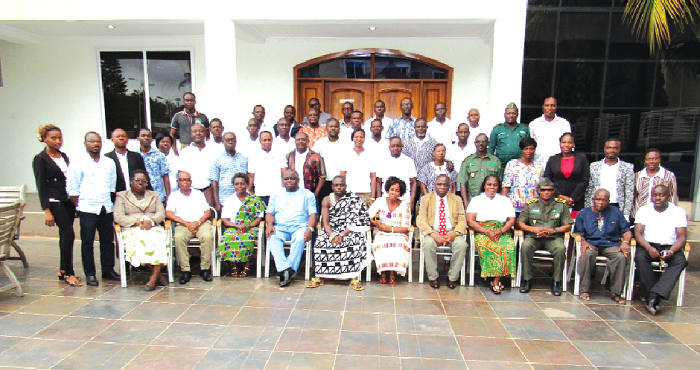
SFMP-Ghana Initiative on Off-Reserve Logging Project ends
What if local communities become fully aware of their rights in timber allocation and logging operations in the off-reserve forests? These include trees of commercial value on farm lands and fallow lands, which are mostly nurtured and managed by community members, and contribute significantly to the country’s timber industry.
What if compensation negotiation processes are streamlined, so that contentions cease, resulting in mutual benefits for all the parties involved in off-reserve logging, thereby enhancing the performance of sustainable forest management instruments such as the Voluntary Partnership Agreement (VPA) on trade in legal timber between Ghana and the European Union (EU)?
Project
This was what the Sustainable Forest Management Partnership-Ghana (SFMP-Ghana) initiative sought to achieve when it was launched sometime last year. The initiative implemented the project titled “Improving Off-Reserve Logging (ORL) in Support of a Functional VPA,” with support from the European Union (EU) and the Food and Agriculture Organisation (FAO) Forest Law Enforcement Governance and Trade (FLEGT) programme.
The focus of the project is in line with the FLEGT VPA’s aspirations that recognise the need for social safeguards for communities affected by illegal ORL.
The project sites were the six selected forest districts of Goasu, Nkawieh, Kade, Jasikan, Dunkwa-on-Offin and Asankragua. Sixteen months on, the project has technically ended with significant achievements, according to Dr Harris Andoh, the representative of one of the partner organisations of SFMP-Ghana.
Addressing the Close-Out of Project Workshop last Wednesday, August 3, 2016, in Kumasi, which was also to validate project products, he mentioned some of the achievements as the production of a “Baseline Study Report” on the legal and administrative procedures for ORL. Another milestone is the “Case Studies Report” that has ascertained the roles of and benefits for the FC, loggers and community members in ORL.
Dr Andoh said the project had further produced a “Booklet on ORL Dos and Don’ts” as defined by the Ghana Legality Standards under the VPA. The Booklet sets out the modalities for a smooth and fair sharing of benefits by stakeholders, in line with the relevant Ghanaian legal framework.
He said the project had additionally developed a “Position Paper on Compensation, Negotiation, Payment and Verification.” The Paper identifies several issues including the nonexistence of guidelines for compensation negotiation and suggests approaches for estimation of compensations.
Also developed are Tools and Templates for use by farmers, loggers and FSD staff in the negotiation of compensation.
Project results
A Project Officer of the SFMP, Betty Boante Abeyie, presented an overview of project results and lessons learnt on key issues such as the permit regime and guidelines, consent of farmers, compensation negotiation and payment, documentation of evidences and roles of stakeholders.
She noted that their findings indicated that the current practice of ORL had shifted to the issuance of Salvage Permits instead of Timber Utilisation Contracts, “while compensation negotiation is purely verbal and non-documented meaning that legality cannot be verified, therefore, compensation value might not be fairly calculated and farmers may be cheated or the logger may overpay because of lack of tools for compensation estimation.”
The Project Coordinator of SFMP-Ghana, Gustav Adu, said based on the findings, four draft templates had been developed which includes Compensation Negotiation Agreement Template, Compensation Payment Template, Compensation Verification Template and Consent letter Template.
Taking participants through the Templates, Mr Adu explained that they had been developed to be farmer friendly and equitable to all parties involved in compensation negotiations. He recommended the adoption of the Templates for systematic compensation negotiations.
Mr Adu called “for a scaling up of the project to integrate the key lessons, tools and recommendations into the Ghana Legality Assurance System,” saying “this will serve as effective protocols for robust verification of ORL negotiation and compensation payment.” He also proposed a replication of the project in other forest districts throughout the country.
Approval of templates
The participants, including staff of the FSD, traditional authorities, and representatives of timber firms and communities, approved the templates and suggested that they should be further simplified for easy adaptation by the negotiating parties.
The Executive Director of the FSD, Raphael Yeboah, was the Chairman for the occasion. He recalled that in 2009, when Ghana signed the VPA with the EU, the reasons included improving on forest law enforcement to enhance sector governance and ensuring that the country continued trade with the EU on forest products.
He said five years on, a lot d been included in the review of laws and policies to align them to governance aspirations and the enactment of LI2184 to implement the VPA. He regretted that in spite of these gains, “we have not been able to issue VPA Licenses,” and admitted that “there is still a gap regarding negotiation and compensation payment.”
Mr Yeboah stated: “I’m fascinated with the results of the project, particularly on the assessment done on sector matters such as permits.” The chairman commended the partners of the SFMP-Ghana for a good work done and urged them to further engage the Ministry of Lands and Natural Resources to secure a legal backing for the use of the templates.
Subsequently, Mr Yeboah declared: “The documents and summaries produced are duly validated.”
